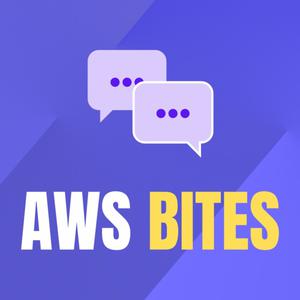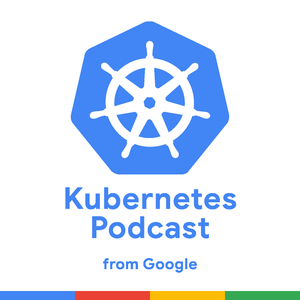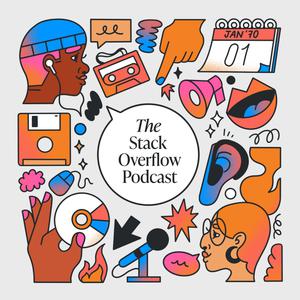
AWS Bites
AWS Bites
AWS Bites is the weekly show where we answer questions about AWS! This show is brought to you be Eoin Shanaghy and Luciano Mammino, certified AWS experts.
- 39 minutes 2 seconds138. How Do You Become A Cloud Architect?
Ready to take your tech career to the cloud and build those awe-inspiring systems you see? Then you're in the right place. This episode of AWS Bites is your blueprint for becoming a successful cloud architect. We're not just going to talk about it; we'll show you what worked for us, sharing the critical skills you need, and a practical path to build your expertise. Whether you're a beginner or looking to take the next step, join us as we equip you with the knowledge and tools to make your mark as a cloud architect!
In this episode, we mentioned the following resources:
- Google Cloud Architecture Definition: https://cloud.google.com/learn/what-is-cloud-architecture
- Market data about the Cloud Professional Services market: https://www.gminsights.com/industry-analysis/cloud-professional-services-market
- EP 91 - Our Journeys into Software and AWS: https://awsbites.com/91-our-journeys-into-software-and-aws/
- AWS Well-Architected Framework: https://aws.amazon.com/architecture/well-architected/
- EP 68 - Are you well architected?: https://awsbites.com/68-are-you-well-architected/
- Cloud Design Patterns: https://learn.microsoft.com/en-us/azure/architecture/patterns/
- The art of scalability (book): https://www.amazon.com/Art-Scalability-Architecture-Organizations-Enterprise/dp/0134032802
- Enterprise integration patterns (book): https://www.amazon.com/Enterprise-Integration-Patterns-Designing-Deploying/dp/0321200683/
- Designing Data-Intensive Applications (book): https://www.amazon.com/Designing-Data-Intensive-Applications-Reliable-Maintainable/dp/1449373321
- AWS Networking Essentials (free guide): https://aws.amazon.com/getting-started/aws-networking-essentials/
- Docker Curriculum (free): https://docker-curriculum.com/
- How Linux works (book): https://www.amazon.com/How-Linux-Works-Brian-Ward/dp/1718500408/
- Exercism coding challenges: https://exercism.org/
- The tangled web (book): https://www.amazon.co.uk/Tangled-Web-Securing-Modern-Applications/dp/1593273886
- Low Level YouTube Channel: https://www.youtube.com/lowlevellearning
- AWS - Best Practices for Security, Identity, & Compliance: https://aws.amazon.com/architecture/security-identity-compliance/
- Supercommunicators (book): https://www.amazon.com/Supercommunicators-Unlock-Secret-Language-Connection/dp/0593862066/
- An Elegant Puzzle (book): https://www.amazon.com/Elegant-Puzzle-Systems-Engineering-Management/dp/1732265186/
- Staff Engineer (book): https://www.amazon.com/Staff-Engineer-Leadership-beyond-management/dp/1736417916/
- EP 58 - What can kitties teach us about AWS: https://awsbites.com/58-what-can-kitties-teach-us-about-aws/
- AWS User Groups: https://aws.amazon.com/developer/community/usergroups/
Do you have any AWS questions you would like us to address?
Leave a comment here or connect with us on X/Twitter: - https://twitter.com/eoins - https://twitter.com/loige
10 January 2025, 12:00 am - 18 minutes 37 seconds137. Transit Gateway Explained
In this episode, David Lynam provides an overview of AWS Transit Gateway, which aims to simplify complex network connectivity between VPCs, VPNs, and on-premises networks. We discuss the limitations of using VPC peering and the benefits Transit Gateway provides through its hub-and-spoke model. The main components of Transit Gateway are explained, including attachments, route tables, associations, and route propagation. We go through some example use cases like sharing Transit Gateways across accounts, network isolation for compliance, routing traffic through security services, and bandwidth/scaling capabilities.
In this episode, we mentioned the following resources:
- How Amazon VPC Transit Gateways work
Do you have any AWS questions you would like us to address?
Leave a comment here or connect with us on X/Twitter: - https://twitter.com/eoins - https://twitter.com/loige
13 December 2024, 12:00 am - 17 minutes 39 seconds136. 20 Amazing New AWS Features
In this pre-re:Invent 2024 episode, Luciano and Eoin discuss some of their favorite recent AWS announcements, including improvements to AWS Step Functions, Lambda runtime updates, DynamoDB price reductions, ALB header injection, Cognito enhancements, VPC public access blocking, and more. They share their thoughts on the implications of these new capabilities and look forward to seeing what else is announced at the conference. Overall, it's an exciting time for AWS developers with many new features to explore. Very important: no focus on GenAI in this episode :)
AWS Bites is brought to you, as always, by fourTheorem! Sometimes, AWS is overwhelming and you might need someone to provide clear guidance in the fog of cloud offerings. That someone is fourTheorem. Check them out at fourtheorem.com
In this episode, we mentioned the following resources:
- The repo containing the code of the AWS Bites website: https://github.com/awsbites/aws-bites-site
- Orama Search: https://orama.com/
- JSONata in AWS Step Functions: https://aws.amazon.com/blogs/compute/simplifying-developer-experience-with-variables-and-jsonata-in-aws-step-functions/
- EC2 Auto Scaling improvements: https://aws.amazon.com/about-aws/whats-new/2024/11/amazon-ec2-auto-scaling-highly-responsive-scaling-policies/
- Node.js 22 is available for Lambda: https://aws.amazon.com/blogs/compute/node-js-22-runtime-now-available-in-aws-lambda/
- Python 3.13 runtime: https://aws.amazon.com/blogs/compute/python-3-13-runtime-now-available-in-aws-lambda/
- Aurora Serverless V2 now scales to 0: https://aws.amazon.com/about-aws/whats-new/2024/11/amazon-aurora-serverless-v2-scaling-zero-capacity/
- Episode 95 covering Mountpoint for S3: https://awsbites.com/95-mounting-s3-as-a-filesystem/
- One Zone caching for Mountpoint for S3: https://aws.amazon.com/about-aws/whats-new/2024/11/mountpoint-amazon-s3-high-performance-shared-cache/
- Appending to S3 objects: https://docs.aws.amazon.com/AmazonS3/latest/userguide/directory-buckets-objects-append.html
- 1 million S3 Buckets per account: https://aws.amazon.com/about-aws/whats-new/2024/11/amazon-s3-up-1-million-buckets-per-aws-account/
- DynamoDB cost reduction: https://aws.amazon.com/blogs/database/new-amazon-dynamodb-lowers-pricing-for-on-demand-throughput-and-global-tables/
- ALB Headers: https://aws.amazon.com/about-aws/whats-new/2024/11/aws-application-load-balancer-header-modification-enhanced-traffic-control-security/
- Cognito Managed Login: https://aws.amazon.com/blogs/aws/improve-your-app-authentication-workflow-with-new-amazon-cognito-features/
- Cognito Passwordless Authentication: https://aws.amazon.com/blogs/aws/improve-your-app-authentication-workflow-with-new-amazon-cognito-features/
- VPC Block Public Access: https://aws.amazon.com/blogs/networking-and-content-delivery/vpc-block-public-access/
- Episode 88 where we talk about VPC Lattice: https://awsbites.com/88-what-is-vpc-lattice/
- Direct integration between Lattice and ECS: https://aws.amazon.com/blogs/aws/streamline-container-application-networking-with-native-amazon-ecs-support-in-amazon-vpc-lattice/
- Resource Control Policies: https://aws.amazon.com/blogs/aws/introducing-resource-control-policies-rcps-a-new-authorization-policy/
- Episode 23 about EventBridge: https://awsbites.com/23-what-s-the-big-deal-with-eventbridge/
- EventBridge latency improvements: https://aws.amazon.com/about-aws/whats-new/2024/11/amazon-eventbridge-improvement-latency-event-buses/
- AppSync web sockets: https://aws.amazon.com/blogs/mobile/announcing-aws-appsync-events-serverless-websocket-apis/
Do you have any AWS questions you would like us to address?
Leave a comment here or connect with us on X/Twitter: - https://twitter.com/eoins - https://twitter.com/loige
29 November 2024, 12:00 am - 21 minutes 46 seconds135. Serverless is making a comeback where you least expect it
In this episode, we discuss the pros and cons of using serverless architecture in enterprise companies. We cover topics like cost, complexity, security, ability to evolve architecture, and more. Overall, we find that serverless can provide benefits like reduced operational costs, improved developer productivity, and increased focus on core business logic for larger companies.
AWS Bites is sponsored by fourTheorem, an Advanced AWS partner that works collaboratively with you and sets you up for long-term success on AWS. Find out more at fourtheorem.com
In this episode, we mentioned the following resources:
- Yan Cui - “Even simple serverless applications have complex architecture diagrams”, so what?
- Dark Matter Developers: The Unseen 99%
- Generating Value Through IT Agility and Business Scalability with AWS Serverless Platform (Gated Link)
Do you have any AWS questions you would like us to address?
Leave a comment here or connect with us on X/Twitter: - https://twitter.com/eoins - https://twitter.com/loige
15 November 2024, 12:24 am - 28 minutes 15 seconds134. Eliminate the IAM User
In this episode, we discuss why IAM users and long-lived credentials are dangerous and should be avoided. We share war stories of compromised credentials and overprivileged access. We then explore solutions like centralizing IAM users, using tools like AWS Vault for temporary credentials, integrating with AWS SSO, and fully eliminating IAM users when possible.
💰 SPONSORS 💰 AWS Bites is brought to you by fourTheorem. If you are looking for a partner to architect, develop and modernise on AWS, give fourTheorem a call. Check out https://fourtheorem.com.
In this episode, we mentioned the following resources:
- Episode 118 "The landing zone: Managing multiple AWS accounts": https://awsbites.com/118-the-landing-zone-managing-multiple-aws-accounts/
- Episode 96: "AWS Governance and Landing Zone with Control Tower, Org Formation, and Terraform" https://awsbites.com/96-aws-governance-and-landing-zone-with-control-tower-org-formation-and-terraform/
- Datadog Security Report (IAM stats): https://www.datadoghq.com/state-of-cloud-security/
- Credentials provider chain in the JavaScript SDK: https://docs.aws.amazon.com/sdk-for-javascript/v3/developer-guide/setting-credentials-node.html
- Credentials provider chain in the AWS CLI: https://docs.aws.amazon.com/cli/v1/userguide/cli-chap-authentication.html
- Episode 45 "What’s the magic of OIDC identity providers?": https://awsbites.com/45-what-s-the-magic-of-oidc-identity-providers/
- Episode 112 "What is a Service Control Policy (SCP)?": https://awsbites.com/112-what-is-a-service-control-policy-scp
- Episode 115 "What can you do with Permissions Boundaries?": https://awsbites.com/115-what-can-you-do-with-permissions-boundaries/
Do you have any AWS questions you would like us to address?
Leave a comment here or connect with us on X, formerly Twitter: - https://twitter.com/eoins - https://twitter.com/loige
1 November 2024, 12:00 am - 28 minutes 28 seconds133. Building Businesses in the Cloud with Fiona McKenna
In this special episode of AWS Bites, Eoin is joined by Fiona McKenna, co-founder and CFO of fourTheorem, to discuss startup advice, hiring and growing teams, creating an environment for success, and managing cloud costs. They cover important themes around people, culture, leadership, and finance from Fiona's extensive experience in the tech industry. 💰 SPONSORS 💰 AWS Bites is sponsored by fourTheorem, an Advanced AWS partner that works collaboratively with you and sets you up for long-term success on AWS. Find out more at https://fourtheorem.com. 🔖 Chapters: 00:00 Intro 02:28 Advice on hiring and growing teams 06:00 Challenges in recruiting the right people 09:06 Advice for startups growing from small to large teams 12:53 More general advice for startups 18:25 Are cloud economics understood by CFOs and finance leaders? 21:42 Advice for large companies migrating to the cloud 25:35 Tips for starting an AWS consultancy 28:32 Closing notes Find Fiona on LinkedIn: https://www.linkedin.com/in/fiona-mc-kenna-174172a2 Do you have any AWS questions you would like us to address? Leave a comment here or connect with us on X, formerly Twitter: - https://twitter.com/eoins - https://twitter.com/loige
17 October 2024, 11:00 pm - 24 minutes 40 seconds132. GitHub Action Runners on AWS
In this episode, we provided an overview of GitHub Action Runners and discussed the benefits of using self-hosted runners on AWS. We covered options including EC2 and CodeBuild for running GitHub Actions, compared pricing across solutions, and shared our hands-on experience setting things up. Overall, using AWS services can provide more control, lower latency, and cost optimization compared to GitHub hosted runners.
💰 SPONSORS 💰 AWS Bites is sponsored by fourTheorem, an Advanced AWS partner that works collaboratively with you and sets you up for long-term success on AWS. Find out more at fourtheorem.com.
The source code for the project we discussed is available on GitHub: fourTheorem/codebuild-gha-runners!
In this episode, we mentioned the following resources.
- Cloudonaut - Self-Hosted GitHub Runners on AWS
- AWS: Best Practices for Working with Self-Hosted GitHub Action Runners at Scale on AWS
- GitHub - philips-labs/terraform-aws-github-runner
- GitHub - garysassano/cdktf-aws-codebuild-github-runners-organization
- GitHub - machulav/ec2-github-runner
- AWS CodeBuild Managed Self-Hosted GitHub Action Runners
- HyperEnv - Self-hosted GitHub runners on AWS
- RunsOn - Self-hosted runners on AWS
- Actions Runner Controller for Kubernetes
- Biome
- SLIC Watch
Do you have any AWS questions you would like us to address?
Leave a comment here or connect with us on X, formerly Twitter: - https://twitter.com/eoins - https://twitter.com/loige
3 October 2024, 11:00 pm - 19 minutes 44 seconds131. What do you do about CloudFormation Drift?
In this episode, we discuss the concept of CloudFormation drift, what causes it, how to detect it, and strategies for resolving it. We explain that drift happens when the actual state of resources diverges from what is defined in the CloudFormation templates. Common causes include manual changes, third party tools, mixing IaC solutions, and automation. We then cover built-in drift detection in CloudFormation and integrating it with alarms. Finally, we suggest approaches for reconciling drift like change sets, deletion protection, and bringing up parallel stacks.
💰 SPONSORS 💰 This episode of AWS Bites is brought to you by fourTheorem. Need to modernize your infrastructure or build scalable cloud solutions? fourTheorem brings the experience to build high-quality, maintainable, and scalable cloud applications that evolve with your business needs. Visit https://fourtheorem.com to see how we can help take your cloud journey to the next level.
In this episode, we mentioned the following resources:
- Ep 31 - CloudFormation or Terraform: https://awsbites.com/31-cloudformation-or-terraform/
- Ep. 121 - 5 Ways to extend CloudFormation: https://awsbites.com/121-5-ways-to-extend-cloudformation/
- Automatic Drift detection (AWS tutorial): https://aws.amazon.com/blogs/mt/implementing-an-alarm-to-automatically-detect-drift-in-aws-cloudformation-stacks
- Ep. 11 - How do you move away from the management console: https://awsbites.com/11-how-do-you-move-away-from-the-management-console/
Do you have any AWS questions you would like us to address?
Leave a comment here or connect with us on X, formerly Twitter: - https://twitter.com/eoins - https://twitter.com/loige
19 September 2024, 11:00 pm - 29 minutes 55 seconds130. Growing in Tech with Farrah Campbell
In this episode, we had the pleasure to interview Farrah Campbell, head of modern compute community at AWS, prolific speaker, and former AWS Hero. We discussed Farrah's career journey from healthcare into tech, tips on public speaking, dealing with imposter syndrome, the pace of innovation in the cloud, and predictions for the future. Farrah shared personal stories and advice for getting started in tech and being an active member of the community. It was inspiring to hear from someone so passionate about helping others learn and grow.
💰 SPONSORS 💰 AWS Bites is brought to you by fourTheorem. If you are looking for a partner to architect, develop and modernise on AWS, give fourTheorem a call. Check out https://fourtheorem.com .
In this episode, we mentioned the following resources:
- Farrah's favourite AWS Bites episode with Jeremy Daly: https://awsbites.com/102-getting-ampt-with-jeremy-daly/
- Farrah on X (Twitter): https://x.com/FarrahC32
- Farrah on Linkedin: https://www.linkedin.com/in/farrahcampbell/
Do you have any AWS questions you would like us to address?
Leave a comment here or connect with us on X, formerly Twitter: - https://twitter.com/eoins - https://twitter.com/loige
5 September 2024, 11:00 pm - 22 minutes 17 seconds129. Lambda Provisioned Concurrency
In this episode, we discuss AWS Lambda provisioned concurrency. We start with a recap of Lambda cold starts and the different concurrency control options. We then explain how provisioned concurrency works to initialize execution environments in advance to avoid cold starts. We cover how to enable it, pricing details, common issues like over/under-provisioning, and alternatives like self-warming functions or using other services like ECS and Fargate.
💰 SPONSORS 💰 This episode of AWS Bites is powered by fourTheorem. Whether you're looking to architect, develop, or modernize on AWS, fourTheorem has you covered. Ready to take your cloud game to the next level? Head to https://fourtheorem.com to check out our in-depth articles, and case studies, and see how we can help transform your AWS journey.
In this episode, we mentioned the following resources:
- Episode 60: "What is AWS Lambda": https://awsbites.com/60-what-is-aws-lambda/
- Episode 104: "Explaining AWS Lambda Runtimes": https://awsbites.com/104-explaining-lambda-runtimes/
- Episode 108: "Solving Lambda Cold Starts in Python": https://awsbites.com/108-how-to-solve-lambda-python-cold-starts/
- Episode 120: "Lambda Best Practices": https://awsbites.com/120-lambda-best-practices/
- AWS Lambda Concurrency Explained by James Eastham: https://www.youtube.com/watch?v=KHACnNKTefI
- Provisioned Concurrency pricing: https://aws.amazon.com/lambda/pricing/#Provisioned_Concurrency_Pricing
- Less than 1% of invocations are cold-starts (statement): https://docs.aws.amazon.com/lambda/latest/operatorguide/execution-environments.html
- Middy Warmup Middleware: https://middy.js.org/docs/middlewares/warmup/
- Lambda speculative warm-up init (mention in the Docs): https://docs.aws.amazon.com/lambda/latest/dg/lambda-runtime-environment.html#:~:text=For%20functions%20using,on%20this%20behavior.
- Episode 64: "How do you write Lambda Functions in Rust": https://awsbites.com/64-how-do-you-write-lambda-functions-in-rust
- Episode 128: "Writing a book about Rust and Lambda": https://awsbites.com/128-writing-a-book-about-rust-and-lambda/
Do you have any AWS questions you would like us to address?
Leave a comment here or connect with us on X, formerly Twitter: - https://twitter.com/eoins - https://twitter.com/loige
22 August 2024, 11:00 pm - 26 minutes 58 seconds128. Writing a book about Rust & Lambda
In this episode, we discuss Luciano's new book project on using Rust to write AWS Lambda functions. We start with a recap on why Rust is a good fit for Lambda, including performance, efficiency, safety, and low cold start times. Luciano provides details on the book's progress so far, the intended audience, and the current published chapters covering Lambda internals, getting started with Rust Lambda, and building a URL shortener app with DynamoDB. We also explore the differences between traditional publishing and self-publishing, and why Luciano chose the self-publishing route for this book. Luciano shares insights into the writing process with AsciiDoc, code samples, SVG image generation, and using Gumroad for distribution. He invites feedback from listeners who have experience with Rust and Lambda.
💰 SPONSORS 💰 AWS Bites is brought to you by fourTheorem. If you are looking for a partner to architect, develop and modernise on AWS, give fourTheorem a call. We have also been working with some of our customers to rewrite some of their most used Lambda functions in Rust, greatly reducing cost and improving performance. If all of this sounds interesting, check us out at https://fourtheorem.com
In this episode, we mentioned the following resources:
- Our previous episode "64. How do you write Lambda Functions in Rust?": https://awsbites.com/64-how-do-you-write-lambda-functions-in-rust
- Crafting Lambda Functions in Rust book's website: https://rust-lambda.com/
- The official Rust book (available for free): https://doc.rust-lang.org/book/
- James Eastham awesome YouTube channel: https://www.youtube.com/@serverlessjames
- AI as a Service book: https://www.manning.com/books/ai-as-a-service
- Node.js Design Patterns book: https://www.nodejsdesignpatterns.com/
- Liran Tal's awesome AsciiDoc book starter template: https://github.com/lirantal/asciidoc-book-starter
Do you have any AWS questions you would like us to address?
Leave a comment here or connect with us on X, formerly Twitter: - https://twitter.com/eoins - https://twitter.com/loige
25 July 2024, 11:00 pm - More Episodes? Get the App
Your feedback is valuable to us. Should you encounter any bugs, glitches, lack of functionality or other problems, please email us on [email protected] or join Moon.FM Telegram Group where you can talk directly to the dev team who are happy to answer any queries.
 Software Engineering Daily
Software Engineering Daily
 AWS Podcast
AWS Podcast
 Software Engineering Radio - the podcast for professional software developers
Software Engineering Radio - the podcast for professional software developers
 Kubernetes Podcast from Google
Kubernetes Podcast from Google
 The Stack Overflow Podcast
The Stack Overflow Podcast
 The Cloudcast
The Cloudcast